Social Psychology Assignment: Deviance and Altruism Concepts
VerifiedAdded on 2023/01/03
|13
|1087
|47
Essay
AI Summary
This essay provides a comprehensive overview of deviance and altruism within the field of social psychology. It begins by defining social psychology and its methods of study, then delves into the concept of deviance, explaining it as a violation of social norms from both sociological and psychological perspectives. The psychological perspective is further explored through various theories including psychoanalytic, cognitive development, and learning theories. The essay then shifts to altruism, defining it as behavior motivated by the well-being of others, and examines the egoistic and altruistic motivations behind such acts. It also discusses theories of altruism, such as the theory of ethics, self-interest, and familiarity. Finally, the essay acknowledges the limitations and ethical considerations of these theories, providing a well-rounded understanding of these core concepts in social psychology.
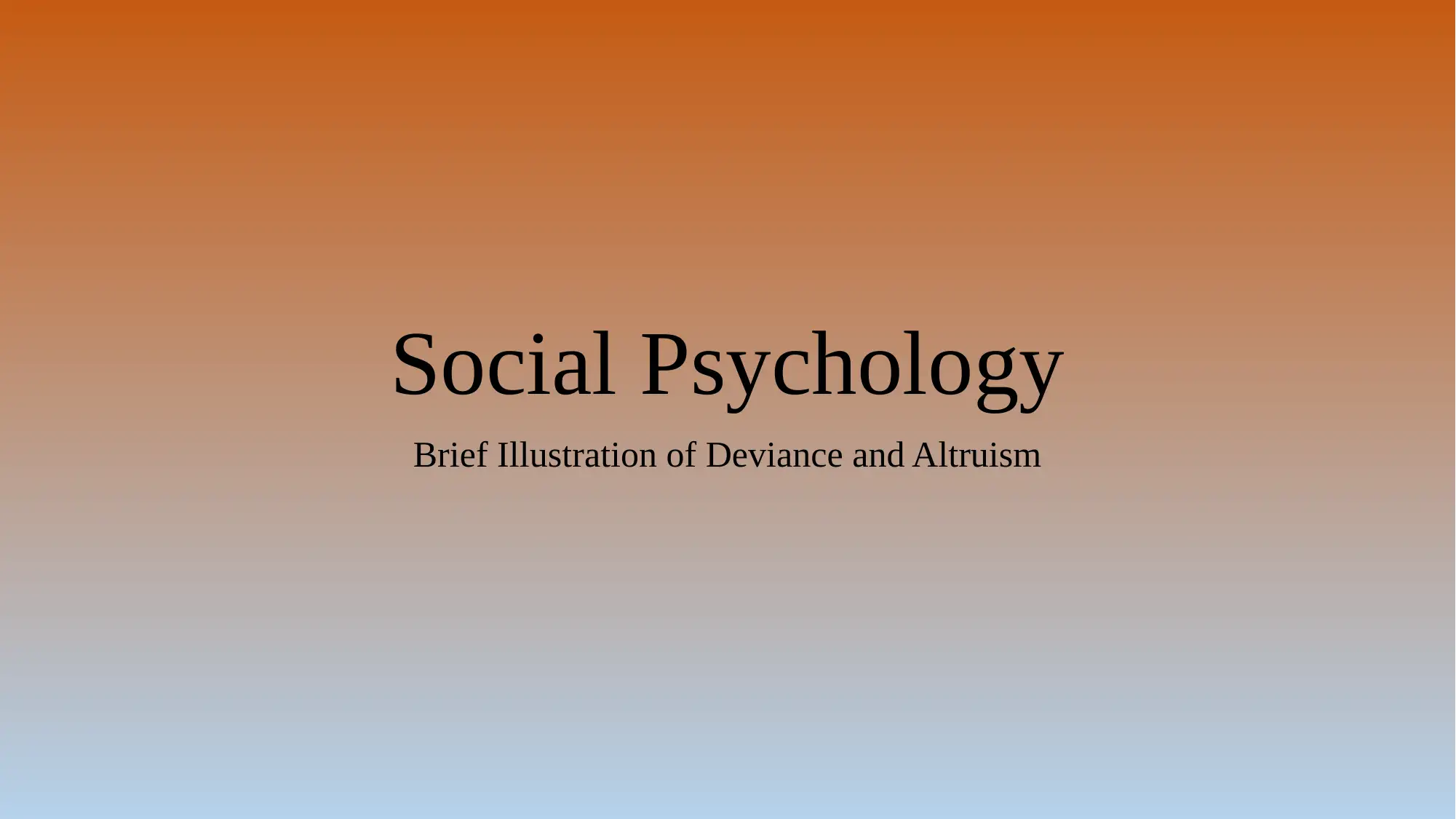
Social Psychology
Brief Illustration of Deviance and Altruism
Brief Illustration of Deviance and Altruism
Paraphrase This Document
Need a fresh take? Get an instant paraphrase of this document with our AI Paraphraser
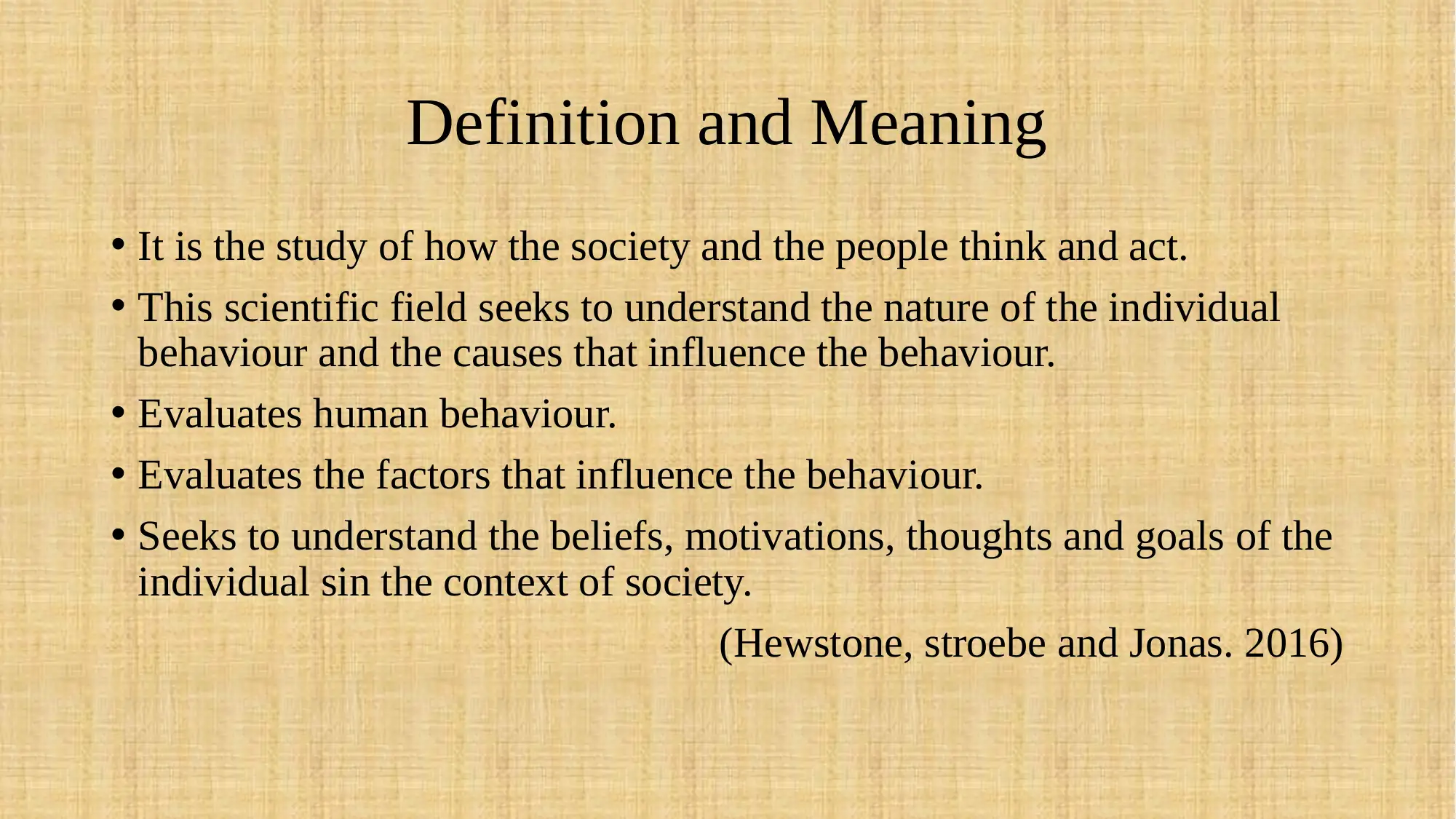
Definition and Meaning
• It is the study of how the society and the people think and act.
• This scientific field seeks to understand the nature of the individual
behaviour and the causes that influence the behaviour.
• Evaluates human behaviour.
• Evaluates the factors that influence the behaviour.
• Seeks to understand the beliefs, motivations, thoughts and goals of the
individual sin the context of society.
(Hewstone, stroebe and Jonas. 2016)
• It is the study of how the society and the people think and act.
• This scientific field seeks to understand the nature of the individual
behaviour and the causes that influence the behaviour.
• Evaluates human behaviour.
• Evaluates the factors that influence the behaviour.
• Seeks to understand the beliefs, motivations, thoughts and goals of the
individual sin the context of society.
(Hewstone, stroebe and Jonas. 2016)
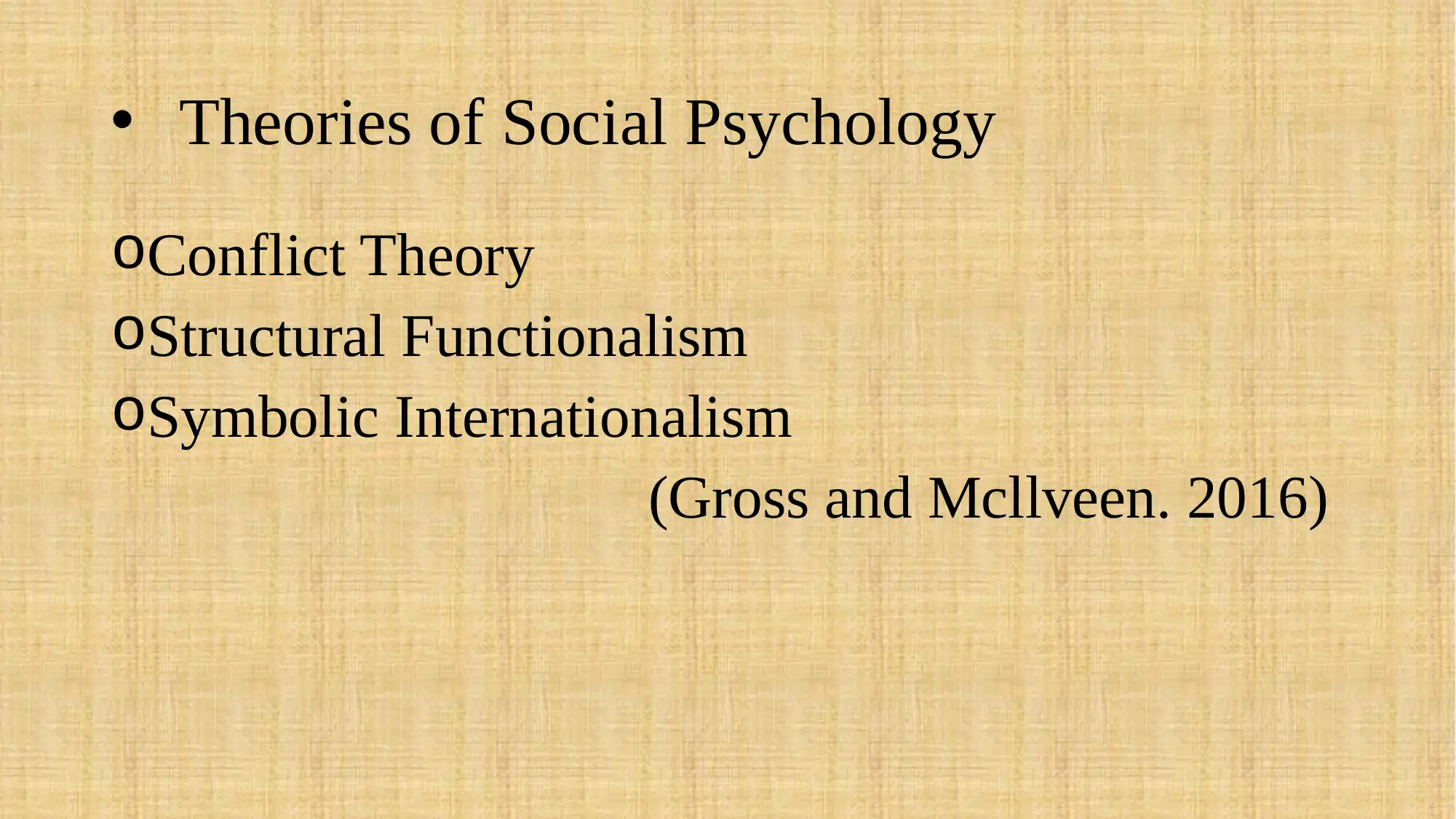
• Theories of Social Psychology
oConflict Theory
oStructural Functionalism
oSymbolic Internationalism
(Gross and Mcllveen. 2016)
oConflict Theory
oStructural Functionalism
oSymbolic Internationalism
(Gross and Mcllveen. 2016)
⊘ This is a preview!⊘
Do you want full access?
Subscribe today to unlock all pages.

Trusted by 1+ million students worldwide
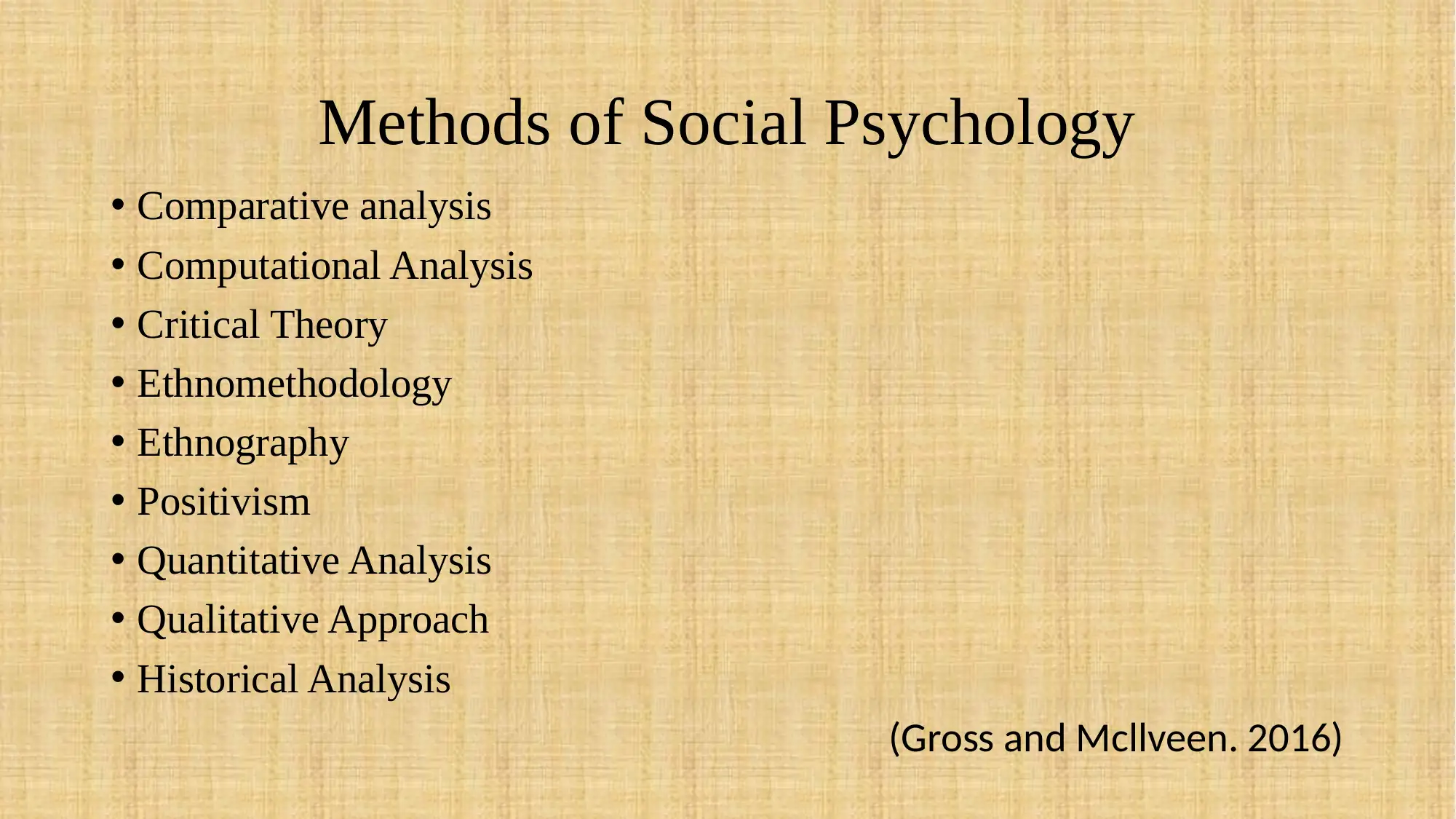
Methods of Social Psychology
• Comparative analysis
• Computational Analysis
• Critical Theory
• Ethnomethodology
• Ethnography
• Positivism
• Quantitative Analysis
• Qualitative Approach
• Historical Analysis
(Gross and Mcllveen. 2016)
• Comparative analysis
• Computational Analysis
• Critical Theory
• Ethnomethodology
• Ethnography
• Positivism
• Quantitative Analysis
• Qualitative Approach
• Historical Analysis
(Gross and Mcllveen. 2016)
Paraphrase This Document
Need a fresh take? Get an instant paraphrase of this document with our AI Paraphraser
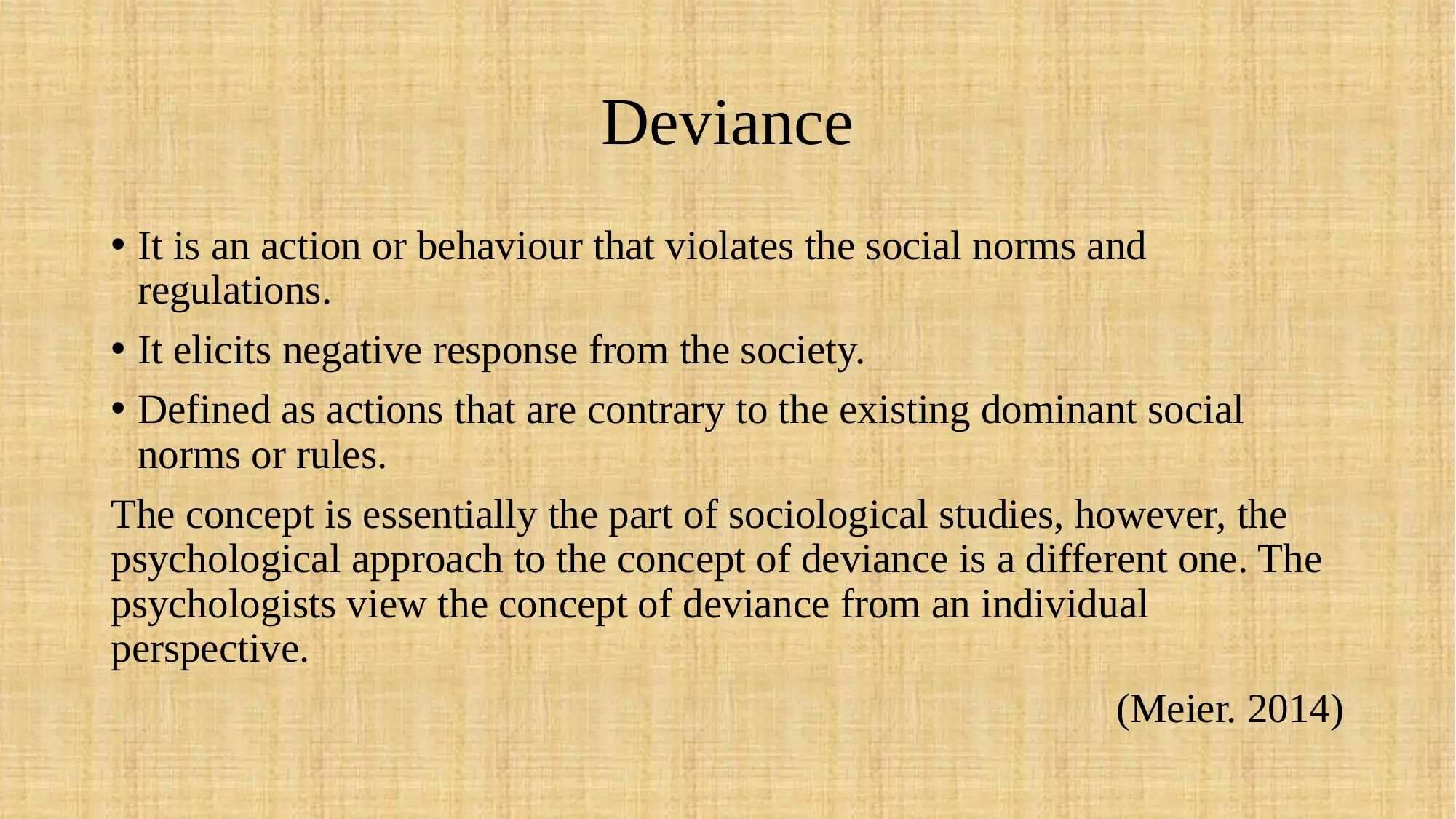
Deviance
• It is an action or behaviour that violates the social norms and
regulations.
• It elicits negative response from the society.
• Defined as actions that are contrary to the existing dominant social
norms or rules.
The concept is essentially the part of sociological studies, however, the
psychological approach to the concept of deviance is a different one. The
psychologists view the concept of deviance from an individual
perspective.
(Meier. 2014)
• It is an action or behaviour that violates the social norms and
regulations.
• It elicits negative response from the society.
• Defined as actions that are contrary to the existing dominant social
norms or rules.
The concept is essentially the part of sociological studies, however, the
psychological approach to the concept of deviance is a different one. The
psychologists view the concept of deviance from an individual
perspective.
(Meier. 2014)
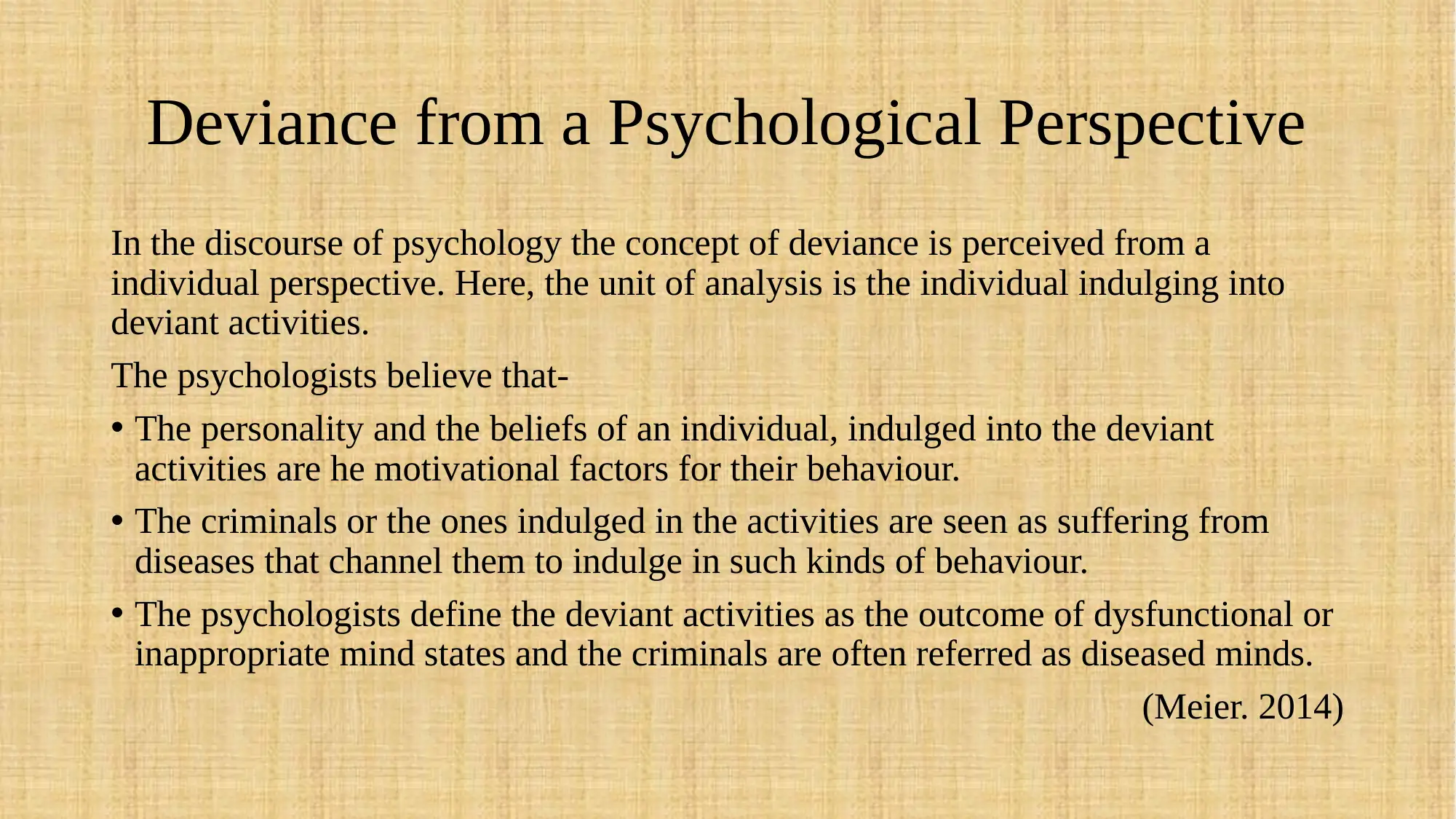
Deviance from a Psychological Perspective
In the discourse of psychology the concept of deviance is perceived from a
individual perspective. Here, the unit of analysis is the individual indulging into
deviant activities.
The psychologists believe that-
• The personality and the beliefs of an individual, indulged into the deviant
activities are he motivational factors for their behaviour.
• The criminals or the ones indulged in the activities are seen as suffering from
diseases that channel them to indulge in such kinds of behaviour.
• The psychologists define the deviant activities as the outcome of dysfunctional or
inappropriate mind states and the criminals are often referred as diseased minds.
(Meier. 2014)
In the discourse of psychology the concept of deviance is perceived from a
individual perspective. Here, the unit of analysis is the individual indulging into
deviant activities.
The psychologists believe that-
• The personality and the beliefs of an individual, indulged into the deviant
activities are he motivational factors for their behaviour.
• The criminals or the ones indulged in the activities are seen as suffering from
diseases that channel them to indulge in such kinds of behaviour.
• The psychologists define the deviant activities as the outcome of dysfunctional or
inappropriate mind states and the criminals are often referred as diseased minds.
(Meier. 2014)
⊘ This is a preview!⊘
Do you want full access?
Subscribe today to unlock all pages.

Trusted by 1+ million students worldwide
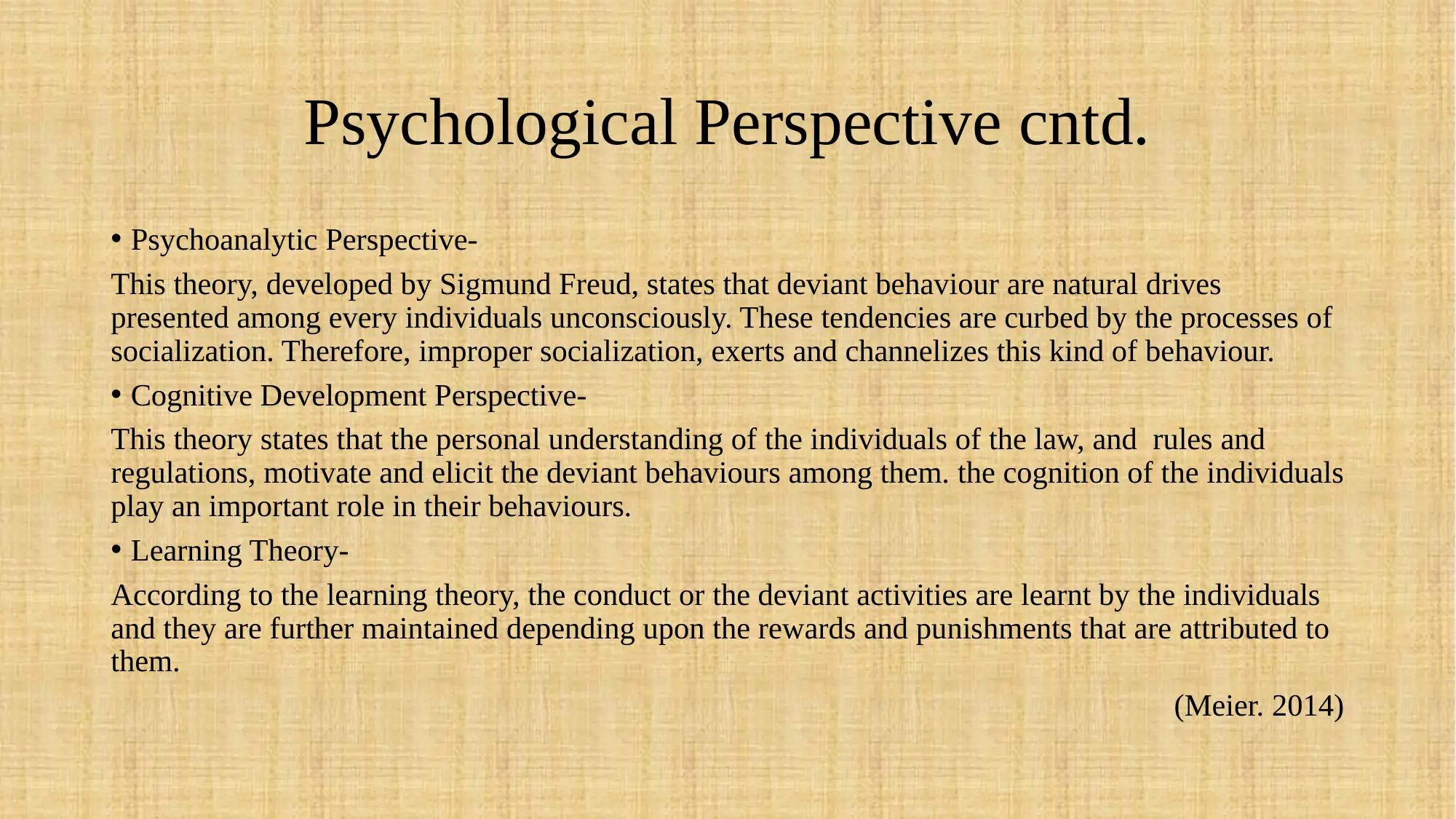
Psychological Perspective cntd.
• Psychoanalytic Perspective-
This theory, developed by Sigmund Freud, states that deviant behaviour are natural drives
presented among every individuals unconsciously. These tendencies are curbed by the processes of
socialization. Therefore, improper socialization, exerts and channelizes this kind of behaviour.
• Cognitive Development Perspective-
This theory states that the personal understanding of the individuals of the law, and rules and
regulations, motivate and elicit the deviant behaviours among them. the cognition of the individuals
play an important role in their behaviours.
• Learning Theory-
According to the learning theory, the conduct or the deviant activities are learnt by the individuals
and they are further maintained depending upon the rewards and punishments that are attributed to
them.
(Meier. 2014)
• Psychoanalytic Perspective-
This theory, developed by Sigmund Freud, states that deviant behaviour are natural drives
presented among every individuals unconsciously. These tendencies are curbed by the processes of
socialization. Therefore, improper socialization, exerts and channelizes this kind of behaviour.
• Cognitive Development Perspective-
This theory states that the personal understanding of the individuals of the law, and rules and
regulations, motivate and elicit the deviant behaviours among them. the cognition of the individuals
play an important role in their behaviours.
• Learning Theory-
According to the learning theory, the conduct or the deviant activities are learnt by the individuals
and they are further maintained depending upon the rewards and punishments that are attributed to
them.
(Meier. 2014)
Paraphrase This Document
Need a fresh take? Get an instant paraphrase of this document with our AI Paraphraser
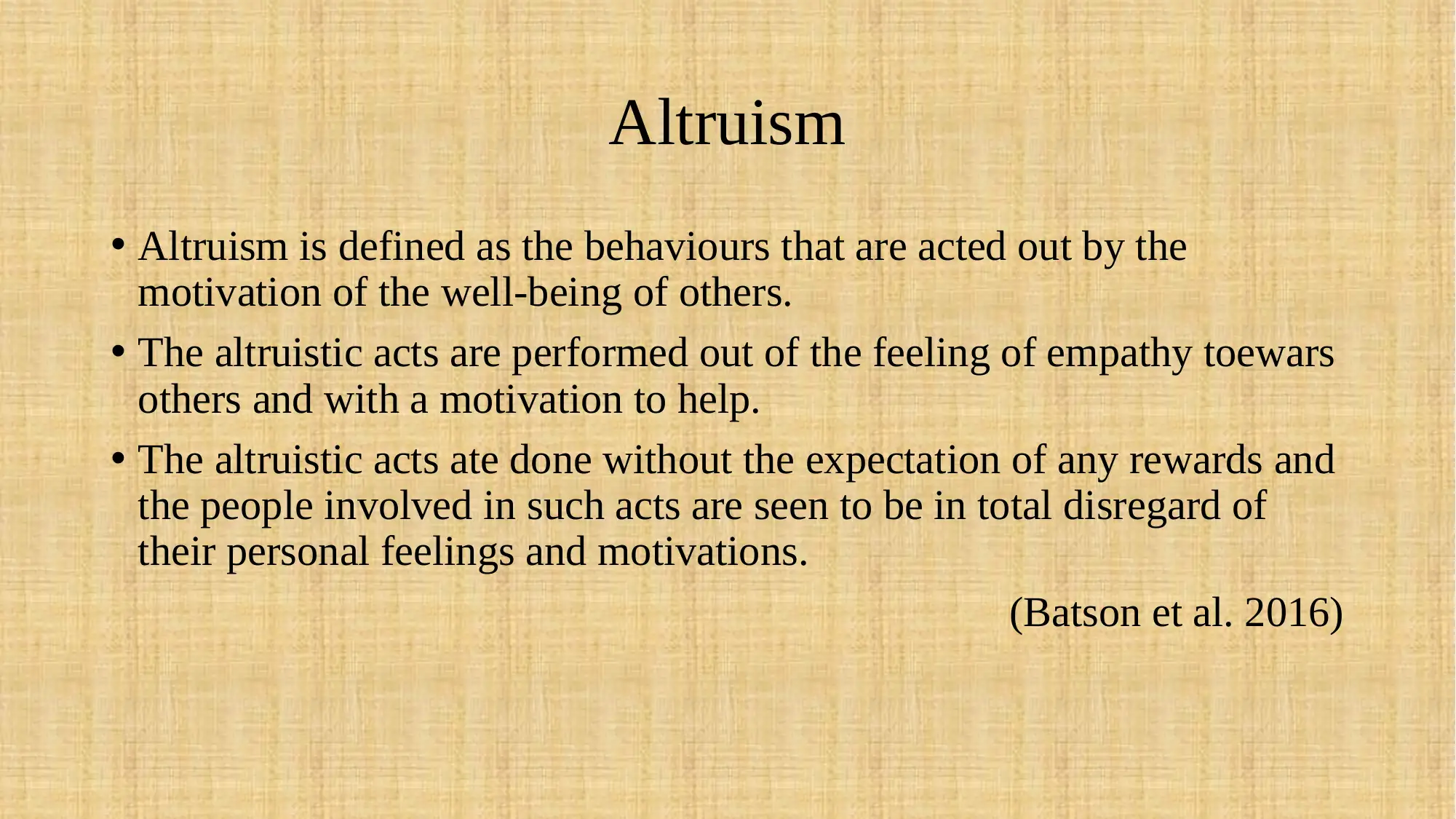
Altruism
• Altruism is defined as the behaviours that are acted out by the
motivation of the well-being of others.
• The altruistic acts are performed out of the feeling of empathy toewars
others and with a motivation to help.
• The altruistic acts ate done without the expectation of any rewards and
the people involved in such acts are seen to be in total disregard of
their personal feelings and motivations.
(Batson et al. 2016)
• Altruism is defined as the behaviours that are acted out by the
motivation of the well-being of others.
• The altruistic acts are performed out of the feeling of empathy toewars
others and with a motivation to help.
• The altruistic acts ate done without the expectation of any rewards and
the people involved in such acts are seen to be in total disregard of
their personal feelings and motivations.
(Batson et al. 2016)
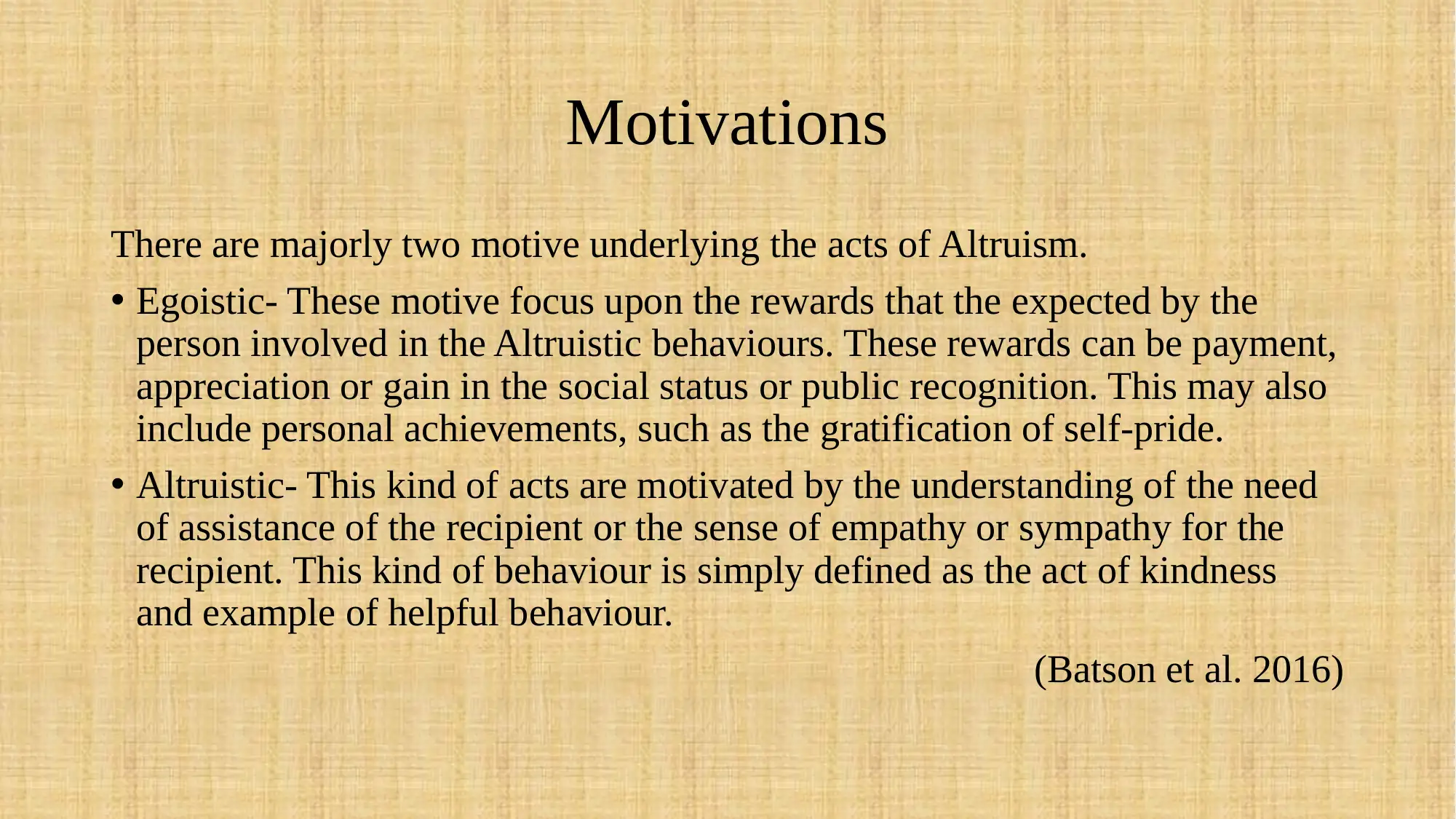
Motivations
There are majorly two motive underlying the acts of Altruism.
• Egoistic- These motive focus upon the rewards that the expected by the
person involved in the Altruistic behaviours. These rewards can be payment,
appreciation or gain in the social status or public recognition. This may also
include personal achievements, such as the gratification of self-pride.
• Altruistic- This kind of acts are motivated by the understanding of the need
of assistance of the recipient or the sense of empathy or sympathy for the
recipient. This kind of behaviour is simply defined as the act of kindness
and example of helpful behaviour.
(Batson et al. 2016)
There are majorly two motive underlying the acts of Altruism.
• Egoistic- These motive focus upon the rewards that the expected by the
person involved in the Altruistic behaviours. These rewards can be payment,
appreciation or gain in the social status or public recognition. This may also
include personal achievements, such as the gratification of self-pride.
• Altruistic- This kind of acts are motivated by the understanding of the need
of assistance of the recipient or the sense of empathy or sympathy for the
recipient. This kind of behaviour is simply defined as the act of kindness
and example of helpful behaviour.
(Batson et al. 2016)
⊘ This is a preview!⊘
Do you want full access?
Subscribe today to unlock all pages.

Trusted by 1+ million students worldwide
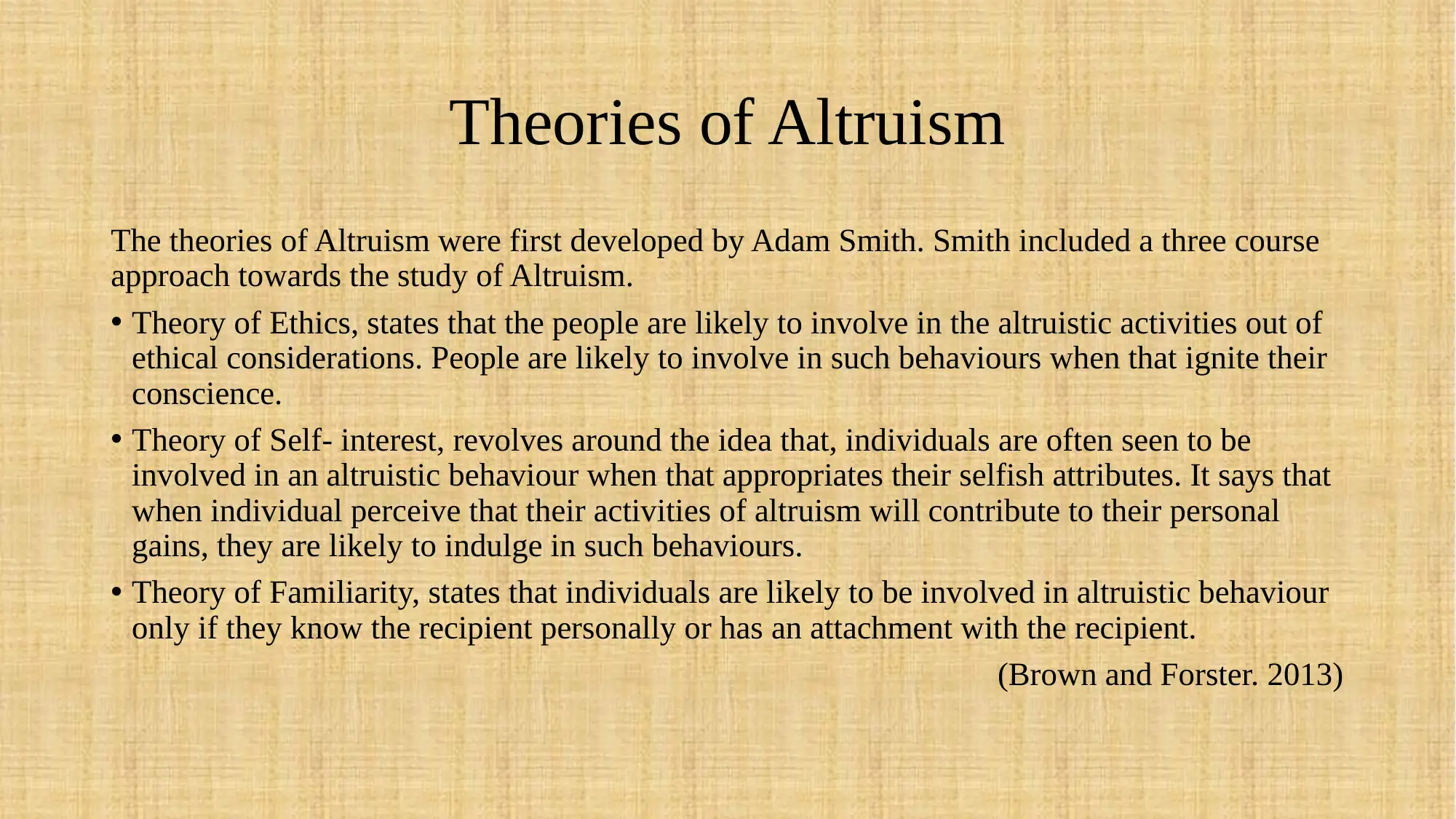
Theories of Altruism
The theories of Altruism were first developed by Adam Smith. Smith included a three course
approach towards the study of Altruism.
• Theory of Ethics, states that the people are likely to involve in the altruistic activities out of
ethical considerations. People are likely to involve in such behaviours when that ignite their
conscience.
• Theory of Self- interest, revolves around the idea that, individuals are often seen to be
involved in an altruistic behaviour when that appropriates their selfish attributes. It says that
when individual perceive that their activities of altruism will contribute to their personal
gains, they are likely to indulge in such behaviours.
• Theory of Familiarity, states that individuals are likely to be involved in altruistic behaviour
only if they know the recipient personally or has an attachment with the recipient.
(Brown and Forster. 2013)
The theories of Altruism were first developed by Adam Smith. Smith included a three course
approach towards the study of Altruism.
• Theory of Ethics, states that the people are likely to involve in the altruistic activities out of
ethical considerations. People are likely to involve in such behaviours when that ignite their
conscience.
• Theory of Self- interest, revolves around the idea that, individuals are often seen to be
involved in an altruistic behaviour when that appropriates their selfish attributes. It says that
when individual perceive that their activities of altruism will contribute to their personal
gains, they are likely to indulge in such behaviours.
• Theory of Familiarity, states that individuals are likely to be involved in altruistic behaviour
only if they know the recipient personally or has an attachment with the recipient.
(Brown and Forster. 2013)
Paraphrase This Document
Need a fresh take? Get an instant paraphrase of this document with our AI Paraphraser
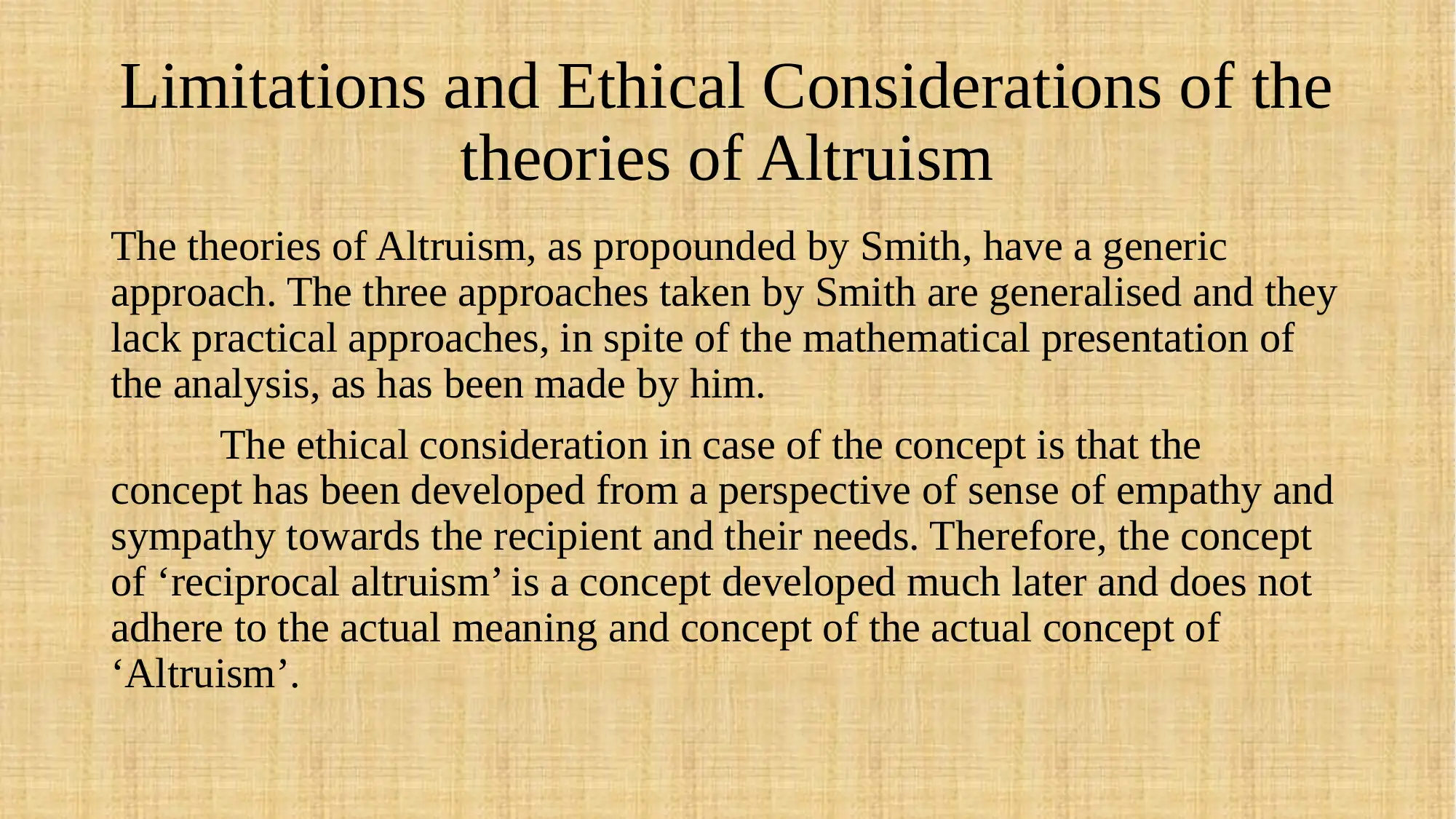
Limitations and Ethical Considerations of the
theories of Altruism
The theories of Altruism, as propounded by Smith, have a generic
approach. The three approaches taken by Smith are generalised and they
lack practical approaches, in spite of the mathematical presentation of
the analysis, as has been made by him.
The ethical consideration in case of the concept is that the
concept has been developed from a perspective of sense of empathy and
sympathy towards the recipient and their needs. Therefore, the concept
of ‘reciprocal altruism’ is a concept developed much later and does not
adhere to the actual meaning and concept of the actual concept of
‘Altruism’.
theories of Altruism
The theories of Altruism, as propounded by Smith, have a generic
approach. The three approaches taken by Smith are generalised and they
lack practical approaches, in spite of the mathematical presentation of
the analysis, as has been made by him.
The ethical consideration in case of the concept is that the
concept has been developed from a perspective of sense of empathy and
sympathy towards the recipient and their needs. Therefore, the concept
of ‘reciprocal altruism’ is a concept developed much later and does not
adhere to the actual meaning and concept of the actual concept of
‘Altruism’.
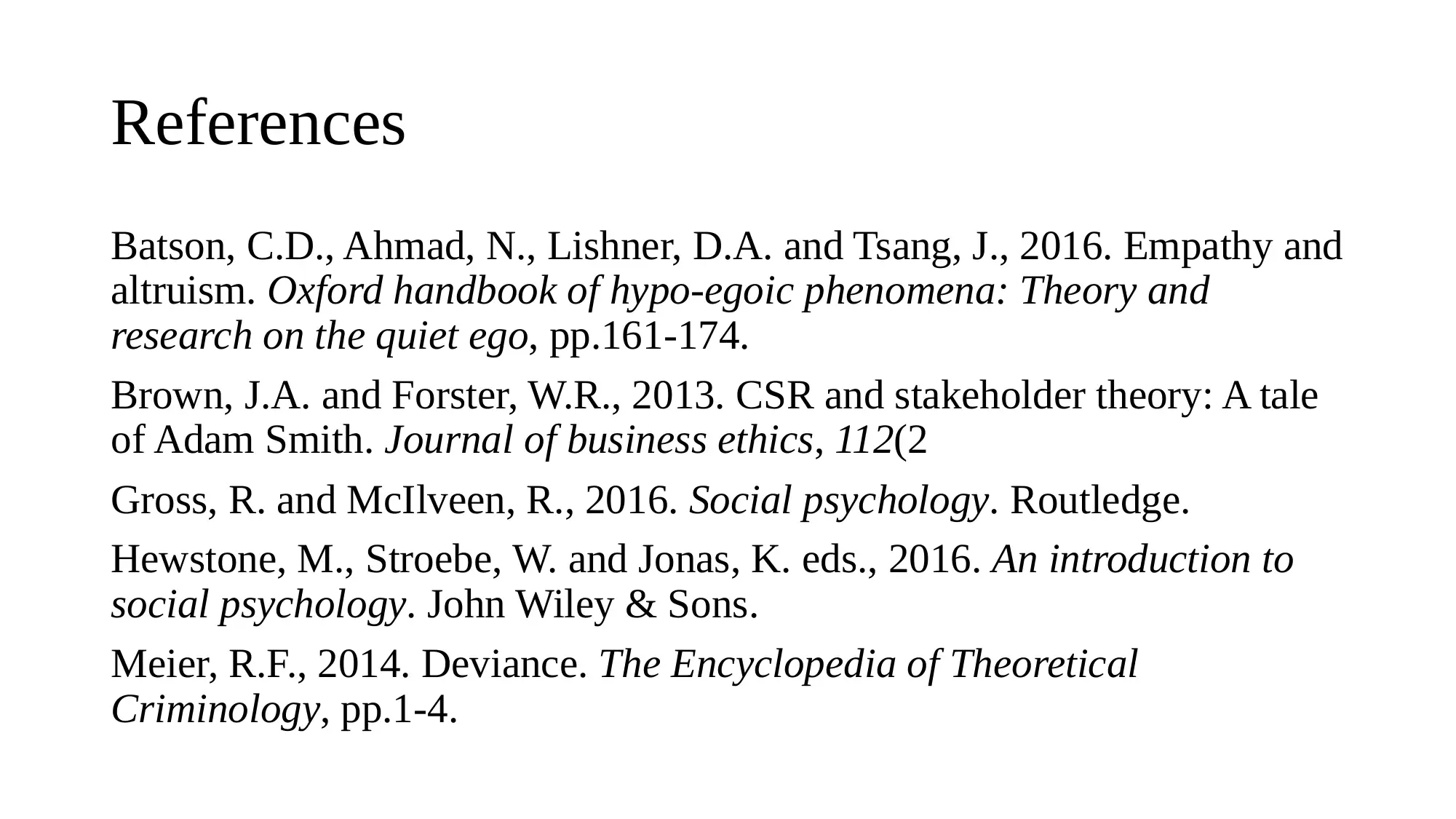
References
Batson, C.D., Ahmad, N., Lishner, D.A. and Tsang, J., 2016. Empathy and
altruism. Oxford handbook of hypo-egoic phenomena: Theory and
research on the quiet ego, pp.161-174.
Brown, J.A. and Forster, W.R., 2013. CSR and stakeholder theory: A tale
of Adam Smith. Journal of business ethics, 112(2
Gross, R. and McIlveen, R., 2016. Social psychology. Routledge.
Hewstone, M., Stroebe, W. and Jonas, K. eds., 2016. An introduction to
social psychology. John Wiley & Sons.
Meier, R.F., 2014. Deviance. The Encyclopedia of Theoretical
Criminology, pp.1-4.
Batson, C.D., Ahmad, N., Lishner, D.A. and Tsang, J., 2016. Empathy and
altruism. Oxford handbook of hypo-egoic phenomena: Theory and
research on the quiet ego, pp.161-174.
Brown, J.A. and Forster, W.R., 2013. CSR and stakeholder theory: A tale
of Adam Smith. Journal of business ethics, 112(2
Gross, R. and McIlveen, R., 2016. Social psychology. Routledge.
Hewstone, M., Stroebe, W. and Jonas, K. eds., 2016. An introduction to
social psychology. John Wiley & Sons.
Meier, R.F., 2014. Deviance. The Encyclopedia of Theoretical
Criminology, pp.1-4.
⊘ This is a preview!⊘
Do you want full access?
Subscribe today to unlock all pages.

Trusted by 1+ million students worldwide
1 out of 13
Related Documents
Your All-in-One AI-Powered Toolkit for Academic Success.
+13062052269
info@desklib.com
Available 24*7 on WhatsApp / Email
![[object Object]](/_next/static/media/star-bottom.7253800d.svg)
Unlock your academic potential
Copyright © 2020–2026 A2Z Services. All Rights Reserved. Developed and managed by ZUCOL.





